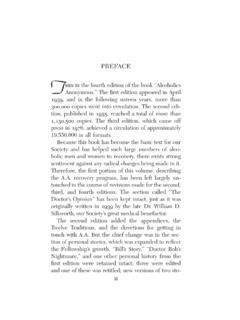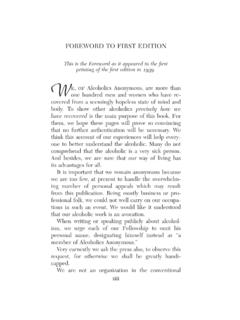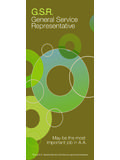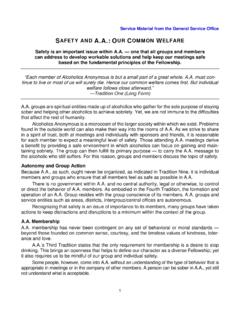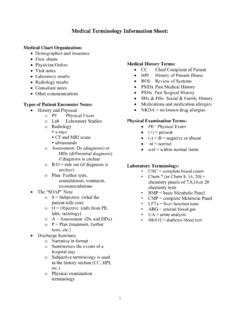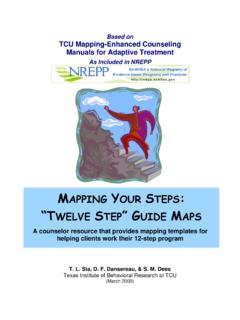Transcription of Chapter 7 - Working With Others - (pp. 89-103)
1 4/4/03 11:17 AM Page 89 Chapter 7 Working WITH Others Practical experience shows that nothing will so much insure immunity from drinking as intensive work with other alcoholics . It works when other activities fail. This is our twelfth suggestion: Carry this message to other alcoholics ! You can help when no one else can. You can secure their confi dence when Others fail. Remember they are very ill. Life will take on new meaning. To watch people recover, to see them help Others , to watch loneliness vanish, to see a fellowship grow up about you, to have a host of friends this is an experience you must not miss.
2 We know you will not want to miss it. Fre quent contact with newcomers and with each other is the bright spot of our lives. Perhaps you are not acquainted with any drinkers who want to recover. You can easily find some by asking a few doctors, ministers, priests or hospitals. They will be only too glad to assist you. Don t start out as an evangelist or reformer. Unfortunately a lot of prejudice exists. You will be handicapped if you arouse it. Ministers and doctors are competent and you can learn much from them if you wish, but it happens that because of your own drinking experience you can be uniquely useful to other alcoholics .
3 So cooperate; never criticize. To be helpful is our only aim. 89 4/4/03 11:17 AM Page 9090 alcoholics anonymous When you discover a prospect for alcoholics Anony mous, find out all you can about him. If he does not want to stop drinking, don t waste time trying to per suade him. You may spoil a later opportunity. This advice is given for his family also. They should be patient, realizing they are dealing with a sick person. If there is any indication that he wants to stop, have a good talk with the person most interested in him usually his wife. Get an idea of his behavior, his prob lems, his background, the seriousness of his condition, and his religious leanings.
4 You need this information to put yourself in his place, to see how you would like him to approach you if the tables were turned. Sometimes it is wise to wait till he goes on a binge. The family may object to this, but unless he is in a dangerous physical condition, it is better to risk it. Don t deal with him when he is very drunk, unless he is ugly and the family needs your help. Wait for the end of the spree, or at least for a lucid interval. Then let his family or a friend ask him if he wants to quit for good and if he would go to any extreme to do so. If he says yes, then his attention should be drawn to you as a person who has recovered.
5 You should be described to him as one of a fellowship who, as part of their own recovery, try to help Others and who will be glad to talk to him if he cares to see you. If he does not want to see you, never force yourself upon him. Neither should the family hysterically plead with him to do anything, nor should they tell him much about you. They should wait for the end of his next drinking bout. You might place this book where he can see it in the interval. Here no specific rule can be given. The family must decide these 4/4/03 11:17 AM Page 9191 Working WITH Others things. But urge them not to be over-anxious, for that might spoil matters.
6 Usually the family should not try to tell your story. When possible, avoid meeting a man through his family. Approach through a doctor or an institution is a better bet. If your man needs hospitalization, he should have it, but not forcibly unless he is violent. Let the doctor, if he will, tell him he has something in the way of a solution. When your man is better, the doctor might suggest a visit from you. Though you have talked with the family, leave them out of the first discussion. Under these conditions your prospect will see he is under no pressure. He will feel he can deal with you without being nagged by his family.
7 Call on him while he is still jittery. He may be more receptive when de pressed. See your man alone, if possible. At first engage in general conversation. After a while, turn the talk to some phase of drinking. Tell him enough about your drinking habits, symptoms, and experiences to encour age him to speak of himself. If he wishes to talk, let him do so. You will thus get a better idea of how you ought to proceed. If he is not communicative, give him a sketch of your drinking career up to the time you quit. But say nothing, for the moment, of how that was accomplished. If he is in a serious mood dwell on the troubles liquor has caused you, being careful not to moralize or lecture.
8 If his mood is light, tell him humorous stories of your escapades. Get him to tell some of his. When he sees you know all about the drinking game, commence to describe yourself as an alcoholic. 4/4/03 11:17 AM Page 9292 alcoholics anonymous Tell him how baffled you were, how you finally learned that you were sick. Give him an account of the struggles you made to stop. Show him the mental twist which leads to the first drink of a spree. We suggest you do this as we have done it in the Chapter on alcoholism. If he is alcoholic, he will understand you at once. He will match your mental inconsisten cies with some of his own.
9 If you are satisfied that he is a real alcoholic, begin to dwell on the hopeless feature of the malady. Show him, from your own experience, how the queer mental condition surrounding that first drink prevents normal functioning of the will power. Don t, at this stage, refer to this book, unless he has seen it and wishes to discuss it. And be careful not to brand him as an alcoholic. Let him draw his own conclusion. If he sticks to the idea that he can still control his drinking, tell him that possibly he can if he is not too alcoholic. But insist that if he is severely afflicted, there may be little chance he can recover by himself.
10 Continue to speak of alcoholism as an illness, a fatal malady. Talk about the conditions of body and mind which accompany it. Keep his attention focussed mainly on your personal experience. Explain that many are doomed who never realize their predicament. Doctors are rightly loath to tell alcoholic patients the whole story unless it will serve some good purpose. But you may talk to him about the hopelessness of alcoholism because you offer a solution. You will soon have your friend admitting he has many, if not all, of the traits of the alcoholic. If his own doctor is willing to tell him that he is alcoholic, so much the better.

